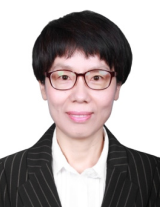The accurate calculation of high-temperature band structure and electrical conductivity for semiconducting materials
Sun Zhimei
School of Materials Science and Engineering, Beihang University, Beijing 100191, China
EXTENDED ABSTRACT: In most first-principles calculations, the electronic structure is usually considered to be fixed with temperature; this is called the rigid band approximation (RBA). Recently, temperature-dependent changes in the electronic structure have gained tremendous attention due to their effect on electrical, optical and thermal properties of materials. In contrast to the case of the conventional RBA, a temperature-dependent electronic structure is significantly affected by electron-phonon (e-ph) coupling and lattice thermal expansion. As the temperature increases, the electron energy should be corrected by e-ph interactions and lattice thermalexpansion effects. The electron energy correction arising from e-ph interactions usually includes the Debye− Waller (DW) and Fan terms that represent two-phonon and one-phonon processes, respectively. In this talk, I will present our recent theoretical work on the anomalous temperature-dependence of electrical conductivity of hexagonal Ge2Sb2Te5 (hex-GST), an extensively studied compound for phase-change memory (PCM). In contrast to the conventional case that the band gap of semiconductors decreases with temperature, hexGST exhibit an increase of the gap with temperature. This abnormal behavior was understood by the interplay between the antibonding states and the phonon processes. Furthermore, at high temperatures, RBA overestimates the calculated electrical-conductivity by up to 1 order of magnitude; by combining the fitted electron scattering, the calculated conductivity values from first principles are in good agreement with experiments. This work lays the groundwork for a consideration of the temperature-dependent electronic structure of PCM materials, and opens the way to perform calculations of the electrical conductivity for semiconducting materials, taking into account the temperature-dependent electronic structure.

Dr. Zhimei Sun is a Cheung Kong Scholar Chair Professor at School of Materials Science and Engineering of Beihang University, China. She received her Ph.D. of Materials Science from Institute of Metal Research (CAS) in 2002, and after which she worked at RWTH Aachen University (Germany) and Uppsala University (Sweden) from 2002 to 2007, and at Xiamen University (China) from 2007 to 2013. Her research includes phase-change memory materials, high-performance structural materials and two-dimensional transition metal carbides/borides.